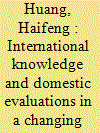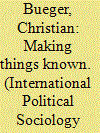| Srl | Item |
| 1 |
ID:
140816


|
|
|
|
|
| Summary/Abstract |
Do knowledge and information about foreign countries affect people’s evaluation of domestic situations? Using unique survey and experimental data, this research finds that Chinese citizens with more positive perceptions and especially overestimation of foreign socioeconomic conditions have more negative evaluations of China and the Chinese government. Moreover, correcting socioeconomic misinformation about foreign countries improves one’s evaluations of China, indicating that the causal direction is at least partly from rosier estimation of foreign conditions to lower domestic evaluations. The relationship between domestic evaluations and international political knowledge, as measured by familiarity with political affairs and figures in foreign countries, is typically not significant, although awareness of political instability in other countries can increase satisfaction with one’s own country. These results contribute both substantively and conceptually to the study of politically relevant knowledge and information, and shed new light on the nuances of information flow and opinion formation in changing societies.
|
|
|
|
|
|
|
|
|
|
|
|
|
|
|
|
| 2 |
ID:
137610


|
|
|
|
|
| Summary/Abstract |
How are international phenomena rendered knowable? By which means and practical devices is international knowledge generated? In this article, I draw on the case of contemporary maritime piracy to introduce a research framework that allows these questions to be addressed. Arguing that the practices of international knowledge generation are poorly understood, I show how concepts from science and technology studies provide the tools to study these practices empirically. Relying on the practice theory of Karin Knorr Cetina, I introduce the concepts of epistemic infrastructures, epistemic practice, and laboratories and demonstrate how they facilitate interesting insights on knowledge generation. I investigate three “archetypes” of epistemic practices in detail and show how these generate knowledge about piracy for the United Nations. The three archetypes are the quantification practices of the International Maritime Organization, the interpretation work of a monitoring group and the network of a special adviser. The article introduces an innovative agenda for studying knowledge generation in international relations by focusing on the practical epistemic infrastructures, which maintain knowledge about international phenomena.
|
|
|
|
|
|
|
|
|
|
|
|
|
|
|
|